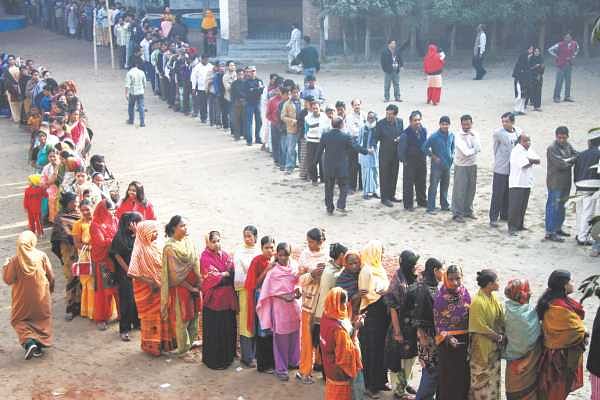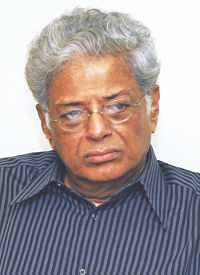| Home - Back Issues - The Team - Contact Us |
 |
| Volume 10 |Issue 49 | December 30, 2011 | |
|
|
Current Affairs
The Lone Ranger Shakhawat Liton Let's put aside for the moment all the uncertainties surrounding the success of the president's dialogue with political parties on formation of a new Election Commission (EC). Let's imagine a rosy picture of the ongoing dialogue. We can go as far as imagining the main opposition BNP-led by its chief Khaleda Zia, will attend the talks. After holding talks with the BNP, the president will consult with the ruling Awami League. A delegation led-by AL chief Sheikh Hasina will join the talks and give some suggestions over formation of the new EC.
For the sake of forming an EC acceptable to all, every political party will cooperate with the president's move. Let's imagine further that Prime Minister Sheikh Hasina will agree with the recommendations of political parties to enact a law introducing an independent search committee for selecting eligible and acceptable people to constitute the EC. The search committee will propose some names and send their proposal to a parliamentary body for scrutiny. The parliamentary body consisting of MPs belonging to all political parties will make a short list of names after scrutiny and will forward the list to the prime minister. Then the president, on advice of the prime minister, will appoint from the list a chief election commissioner and other election commissioners to constitute the EC. No one will be able to raise question about the eligibility and neutrality of the EC. It will be largely acceptable to all, something quite unprecedented in this country. Thus, the AL-led government's move to form an EC acceptable to all will come to a success. Let's stop fantasising at this point. We are now in reality. And we are aware of our political culture. We can remember more or less the previous records of elections and role of ECs during the regime of partisan and non-partisan caretaker governments. Keeping all the facts in minds, we want to raise a question here– after the cancellation of the caretaker government, will that EC [we imagined earlier] alone be able to hold the next parliamentary election in a free and fair manner under the Awami League-led government? Let's remember Chief Election Commissioner ATM Shamsul Huda's recent remarks to get the answer to the question. "It is difficult to hold a free and fair election under a partisan government," said the CEC on November 22 at a luncheon meeting organised by the American Chamber of Commerce in Bangladesh (AmCham) at a hotel in the capital. While speaking on the topic “Role of the Election Commission in Conducting a Free and Fair Election”, the polls chief said neither the prime minister nor other ministers ever pursued the EC to do something in their favour. But the MPs at the local level try to influence officers-in-charge of police and upazila nirbahi officers to work for them, he said. “They [MPs] have control over the local administrative officials. Moreover, during the election days we have to engage a huge number of workforces, who do not belong to the administrative control of the commission. That is why, it is difficult to hold a free and fair election under the political (partisan) government,” Huda said. What Huda said is nothing new to people. But rely on his remarks because it was Huda, after all, who led the current EC that held the ninth parliamentary election on December 29 in 2008 which was lauded home and abroad. How did he do such a marvelous job? Shamsual Huda was appointed CEC in February 2007 by the then non-partisan caretaker government. His two colleagues in the EC – two other elections commissioners– were also appointed by the same non-partisan government. Their appointment came after resignation of the EC-led Justice MA Aziz who and almost all of his other colleagues, were appointed by the then BNP-Jamaat-e-Islami led government. However, after being appointed as the CEC and ECs, Huda and his two colleagues got maximum support and cooperation from the then caretaker government. So they were able to finally hold the December 29 parliamentary polls in a free and fair manner. But Huda's experience during the current government's tenure seems not so pleasant. In the last three years since the AL-led government assumed office in January 2009, the EC conducted polls to municipalities, union parishads, city corporations and a number of parliamentary by-polls. CEC Huda of course gathered his experiences from those polls. In his experiences the role of MPs — who have control over the local administrative officials — has been very significant. What the MPs did in the last three years was not directly related to their own elections. But when they themselves will contest the next parliamentary elections, what will be their role? After the latest constitutional amendment the next parliamentary election will be held any time within 90 days before dissolution of the current parliament. And during the said 90 days-timeframe, MPs of the current parliament will remain in their offices, meaning they will contest the polls remaining as MPs! It will not ensure a level playing field in the polls since MPs by virtue of their offices have unfair advantage over other candidates. If the government-party backed candidates fail to win the adequate number of seats in the next parliamentary polls, the government will not be able to continue in office. It is hard to believe that the ruling party and the MPs themselves will sit by and allow such a disaster (for them). Successive governments have a track record of using the public administration to rig or manipulate the parliamentary polls in favour of the immediate past ruling parties to ensure a comeback to power. This trend continued till before the fifth parliamentary polls held in 1991 under a makeshift government. The culture of misusing the government administration in the election destroyed people's confidence in the partisan government. And it gave birth to the caretaker government system in 1996. Since introduction of the caretaker government, the parliamentary polls held in 1996, 2001 and 2008 have been widely acceptable. The then ECs were able to conduct free and fair parliamentary polls under the caretaker governments. But the previous ECs were mired in controversy during the partisan governments. Because, under partisan governments, the ECs faced difficulties to hold free and fair polls to some parliamentary by-polls and different local government bodies. Past experiences prove that the ECs perform independently only under a caretaker government regime. But the caretaker government system has been cancelled in June of 2011, triggering uncertainty over holding the next parliamentary polls in a free and fair manner. The majority people still firmly believe a free and fair parliamentary election cannot be possible under a partisan government. So, it is still difficult to hope that the EC on its own can do the job. It is still uncertain whether the next EC will be formed through political consensus or unilateral decisions. The writer is Senior Reporter, The Daily Star. Copyright
(R) thedailystar.net 2011 |

